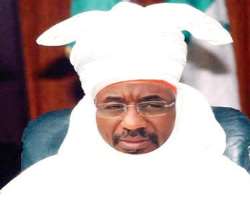Emir of Kano plans law barring Kano men from polygamy

The Emir of Kano, Muhammadu Sanusi II, says he is on the verge of proposing a law which will restrict poor men in the emirate from marrying many wives.
Sanusi said this in Abuja on Sunday at the 50th anniversary of the death of Ambasador Isa Wali, a former Nigerian High Commissioner to Ghana who died on active duty on February 19, 1967.
The monarch said he had been able to establish a connection between polygamy, poverty and terrorism.
Sanusi said he would ensure that the law would be passed by the Kano State Government as a way of immortalising the late Wali who was one of the first northern elements to advocate gender equality.
He said, 'Those of us in the North have all seen the economic consequences of men who are not capable of maintaining one wife, marrying four. They end up producing 20 children, not educating them, leaving them on the streets, and they end up as thugs and terrorists.
'It is perhaps a tribute to Mallam Isa that today, as I speak, in the palace in Kano a sub-committee of scholars, which I set up and has been working for about a year, is finalising the final sections of a family law we intend to introduce in Kano which will address some of the issues that Mallam Isa was concerned about.
'The law will address what Islam says on marriage, it will outlaw forced marriages, it will make domestic violence illegal, it will put in conditions that you need to fulfil before you can marry a second wife, it will spell out the responsibilities of a father beyond producing a child.
'It is a big law which covers a whole range of issues from consent to marriage, to maintenance to divorce, to maintenance of children and inheritance. It will be the first time in northern Nigeria that a Muslim law on personal status will be codified.'
Sanusi, who said there was nothing wrong with polygamy if it was practised properly, maintained that women must be given the opportunity to thrive.
The emir said his late predecessor, Ado Bayero, as well as all the princes in Kano were trained in Islamic studies by Wali's grandmother.
He, therefore, argued that since women were responsible for shaping the lives of future kings in Kano, they were equally qualified to do greater things.
